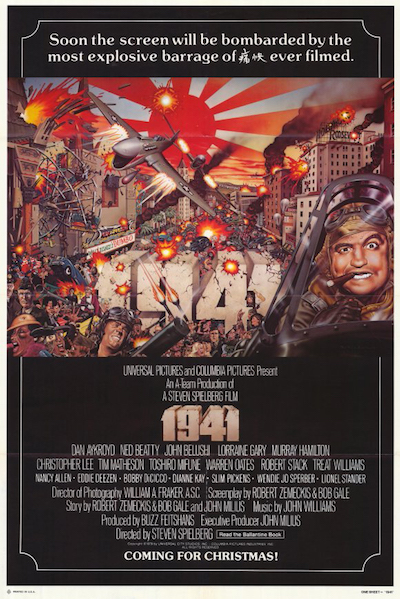 There are two uses for the eight-film Steven Spielberg: Director’s Collection now on Blu-ray. One: holiday gifts. Assuming you already own Jaws (1975), E.T.: The Extra-Terrestrial (1982), Jurassic Park (1993), and The Lost World: Jurassic Park (1997)–and what self-respecting movie fan doesn’t own at least the first three?–you can give your old discs to friends and family and keep the ones in this nicely packaged box set, as the transfers and content are exactly the same. Heck, throw in a Blu-ray player if they don’t own one; they’re pretty cheap to come by these days.
There are two uses for the eight-film Steven Spielberg: Director’s Collection now on Blu-ray. One: holiday gifts. Assuming you already own Jaws (1975), E.T.: The Extra-Terrestrial (1982), Jurassic Park (1993), and The Lost World: Jurassic Park (1997)–and what self-respecting movie fan doesn’t own at least the first three?–you can give your old discs to friends and family and keep the ones in this nicely packaged box set, as the transfers and content are exactly the same. Heck, throw in a Blu-ray player if they don’t own one; they’re pretty cheap to come by these days.
Two, of course, is to fill in some blanks in your collection of Spielberg Blus. The package includes the international theatrical release version of his landmark TV movie, Duel (1971), his fine debut feature, The Sugarland Express (1974), which fits in with downbeat, character-driven “70s movies” as much as it does with his own work, and Always (1989), an homage to 40s tearjerkers and A Guy Named Joe (1943) that was a rare misfire for a filmmaker who had become a phenomenon in the intervening 15 years. The purist in me wishes this box set had dropped the repackaged hits and included Munich (2005), and, if still available, the original “Movie of the Week” version of Duel and his other early TV credits, like the subsequent rare bird Something Evil (1972). Munich would complete our collections of Spielberg Blu-rays; maybe next year, on its 10th anniversary, as he releases another true-life espionage thriller, St. James Place.
The real excitement about this box set is the Blu-ray debut of 1941 (1979), in both its original release form and an extended edition that bowed on TV before making it to laserdisc and DVD. The Blu-ray is a massive improvement over the LD (which I owned in that long-obsolete format) and the DVD, a smeary, non-anamorphic mess that I thought would never be upgraded. It’s also the bow of the extended edition with the added scenes properly scored, a terrific bonus for fans of Spielberg’s epic comedy.
 I’m one of them. But I wasn’t then. Contrary to popular belief the hugely expensive movie wasn’t a wipeout for Universal and Columbia, which co-produced it, yet it was a keen disappointment with critics and audiences expecting another Spielberg triumph after Jaws and Close Encounters of the Third Kind (1977). Thirty-five years ago I panned it in my high school newspaper, along with two other holiday season releases, Star Trek: The Motion Picture and The Black Hole.
I’m one of them. But I wasn’t then. Contrary to popular belief the hugely expensive movie wasn’t a wipeout for Universal and Columbia, which co-produced it, yet it was a keen disappointment with critics and audiences expecting another Spielberg triumph after Jaws and Close Encounters of the Third Kind (1977). Thirty-five years ago I panned it in my high school newspaper, along with two other holiday season releases, Star Trek: The Motion Picture and The Black Hole.
Over subsequent viewings on cable, however, it grew on me. By and large it doesn’t make me laugh; it’s too grandiose for that, and you’re too often aware of the expense driving its crude, cartoonish content. “Great, but not funny,” is how Stanley Kubrick, of the great and funny Dr. Strangelove (1964), is said to have summed up 1941, which is closer in spirit to It’s a Mad, Mad, Mad, Mad World (1963). Unlike Kubrick, Spielberg isn’t one for cutting-edge satire, which is why it feels toothless. And some of it, like the airborne subplot with Tim Matheson and Nancy Allen, never takes off. The extended version gives the multiple storylines room to breathe, as was intended, and it does have a few nice touches, but I can’t say I can prefer it. It’s the theatrical version that somehow sneaked up on my affections, and I can recall my favorite bits and pieces by heart.
Like: Christopher Lee, Toshiro Mifune, and Slim Pickens in the sub, not for anything they do, but because it’s Lee, Mifune, and Pickens, the unlikeliest of combos, in the same frame. The way Mifune’s crewman says “Hollywood,” and that the Japanese characters are generally endearing, a notion not unlike the treatment of the Red Menace in The Russians Are Coming! The Russians are Coming! (1966). John Belushi is one-note as the crazed airman “Wild” Bill Kelso, and that he only acknowledges Dan Aykroyd, rather mix it up with him, is a bummer, but he and an equally gaga Warren Oates are a matched pair–everything with the veteran actors, including Robert Stack (a year before Airplane!), Jaws cast member Murray Hamilton, stuck in the Ferris Wheel with Eddie Deezen and his dummy, and Lionel Stander (“Close, Ward…close“) sparkles. The little boy who says “Dad…you’re ruining Christmas!” to poor Ned Beatty; I always feel sorry for Beatty’s very well-played character, the one who earns the most scorn as everyone falls to pieces in a panic, which tends to still my laughter. I do laugh at the dance hall sequence (with the much-missed Wendie Jo Sperber), a beautiful piece of comic choreography, timing, acting, and cutting, by the great Michael Kahn. The scene anticipates my favorite in the entire Spielberg action canon, the opening of Indiana Jones and the Temple of Doom (1984). It’s not too late to direct a full-on musical comedy, Mr. Spielberg…
1941‘s three Oscar nominations, for Visual Effects, Sound, and Cinematography, were all deserved. What I fell hard for, over time, is the smoky, filtered look William A. Fraker gave the production (nicely replicated, at last, on Blu-ray) and the incredible miniatures–what a thrill it was to see them on display on the Universal Studios Tour a year or two later when I visited. (All three of the movies I knocked in the school newspaper are like pre-CGI objets d’art in 2014.) Oh, and John Williams’ fun “martial” score, which gooses even the dimmest gags. And…well, that’s how a cult movie is born, warts and all, and short of seeing it again on the big screen (the biggest screen possible) this Blu-ray is the way to go.
 The keeper of the 1941 flame is its co-writer, Bob Gale, who mapped out its interweaving storylines with Robert Zemeckis. “What’s fun about movies is that you don’t know what’s going to be talked about 35 years later, and what anyone will be saying about it,” says Gale, who chatted with me for a few minutes about the new disc. He said that the LD and DVD slowly helped the movie recover from its scathing reception that Christmas (and 1941 is very much a “Christmas movie,” though rarely shown as such), in that the restored footage made it “the movie it was supposed to be.”
The keeper of the 1941 flame is its co-writer, Bob Gale, who mapped out its interweaving storylines with Robert Zemeckis. “What’s fun about movies is that you don’t know what’s going to be talked about 35 years later, and what anyone will be saying about it,” says Gale, who chatted with me for a few minutes about the new disc. He said that the LD and DVD slowly helped the movie recover from its scathing reception that Christmas (and 1941 is very much a “Christmas movie,” though rarely shown as such), in that the restored footage made it “the movie it was supposed to be.”
“The original idea was to have all these disparate characters do all these different things, on a collision course that results in an air raid and a riot that were based on actual events in Los Angeles in 1942,” Gale says. “The restored version, now for the first time with John Williams’ score as intended, gives you a much better sense of who these characters are and their motivations. The pacing is better–it takes its time through the daytime portion. Steven was rushing to meet his release date, so he was brutal in cutting the first hour, to get to the nighttime action quicker. I think today’s audience better understands the conceit of jumping from character to character, which is more common in film and television.”
Gale is happy to stroll down memory lane regarding the super production. (Many stories are shared in the comprehensive “making-of” included on the disc, which has been ported over from the LD.) “There were only two locations we weren’t at,” he recalls of his time on set with Zemeckis. “We were 26 and unmarried. ‘What do you want to do tonight?’ I’d ask, and he’d say, ‘Well, let’s go watch Steven crash a plane onto the street at the Burbank studios. Or watch John Belushi land a P-40 at Indian Dunes.’ And we’d be asked to throw out a line or two as the scenes were being shot. Some of actors came up with a lot of great stuff as well, particularly Dan Aykroyd [in his film debut, along with Mickey Rourke.]. The business with the General Motors refrigerator when he’s babbling in the tank was all his. Steven, too, of course, had much to add. ‘I have a great idea!’ he said one day. ‘Let’s drive a tank through a paint factory!’ ‘But we already shot the unpainted tank on the pier for the end of the movie,’ I said. ‘No problem!’ he responded. ‘We’ll drive it through a turpentine factory and clean it off!'”
With Zemeckis as director, and Spielberg as executive producer, the 1941 veterans would come up with a classic comedy, Used Cars, in 1980. (Impossible to overrate, that film is now available on Blu-ray from Twilight Time.) They hit pay dirt a few summers later, with Back to the Future, an Oscar nominee for its time-twisting script. With 1941 finally getting a worthwhile transfer and some reappraisal, Gale says to look forward to “a lot in the works” with Future on the eve of its 30th anniversary.





Comments